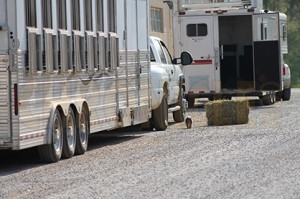Travel Precautions For Equine Vesicular Stomatitis
LEXINGTON, KY (Aug. 13, 2014) – Each summer, equestrians travel with their horses to explore different parts of North America. The summer heat and bugs create a melting pot for equine viruses to keep travelers from enjoying the summer and horse events. This year, equestrians are faced with Equine Vesicular Stomatitis. So far, the virus has been reported in Colorado and Texas with the first detections in southern Texas, early 2014. In mid-July, the first case was reported in Colorado from the National Veterinary Services Laboratory.
Equine Vesicular Stomatitis afflicts not only horses, but any livestock, wildlife and even humans. It is a contagious disease, but rarely life threatening. Though not completely understood, the transmission of this virus is thought to be mainly through insects. Equine Vesicular Stomatitis can be painful as it causes oral blisters and sores making it hard for horses to eat or drink. Appearance of the virus can take up to eight days after contamination. Early symptoms are slight fever, excessive drooling, and small blisters that appear around nostrils, gums, tongue, lips and corners of the mouth. Some lesions may also appear around the coronary band which may cause some lameness.
If you are planning to travel with your horse, extreme precaution should be taken. Be aware that some equine shows have canceled or re-scheduled to prevent this virus from spreading. If you decide to travel, it is important that you keep up with fly spray and even disinfect your trailer before and after your trip. Avoid going to large horse shows and trail rides as riders come from all over the country. As previously stated, it can take up to eight days for the virus to surface, so you may be around horses that are infected without knowing.
Should you suspect your horse has been infected, you may want to place him in quarantine. To confirm if your horse has fallen to Equine Vesicular Stomatitis, you will need a blood test performed by your veterinarian. If you have a confirmed case, horses should not be moved or brought to your property.
If you are moving a horse across the country, there may be health certificate requirements for certain areas. Some horse shows may require health certificates performed within the previous 2-5 days. To learn more about these requirements, contact your state veterinarian for more information or visit usrider.org and click on travel safety > Transportation Info > Links to State Equine Info. NOTE: If you are moving your horse internationally, contact the USDA for any movement restrictions or testing requirements.
USRider – in its 13th year of operation – is the only company to provide emergency roadside assistance for horse owners. Through the Equestrian Motor Plan, USRider provides nationwide roadside assistance and towing services along with other travel-related benefits to its Members. The plan includes standard features such as flat-tire repair, battery assistance, lockout services, and roadside repairs for tow vehicles and trailers with horses, plus towing up to 100 miles. As an additional service, USRider maintains a national database that includes emergency stabling, veterinary and farrier referrals.
For more information about the USRider Equestrian Motor Plan, visit www.usrider.org online or call (800) 844-1409. For additional safety and travel tips, visit the Equine Travel Safety Area on the USRider website at www.usrider.org.











